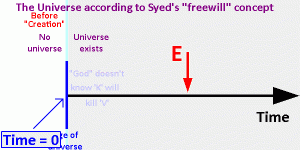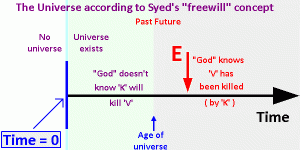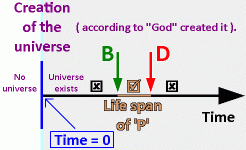Examining the "God" of Syed, part 5
Oversight and deduction
Syed has said it's only minor details which "God" doesn't know, (which IMHO seems trite and
ad hoc). I have prepared an animated
.gif to show a particular event
E in which a person 'K' kills another person 'V', (i.e. Killer and Victim).

The diagram represents the universe, from before creation, through the creation, up to the event
E and onwards past the event
E.
The diagram also attempts to show what "God" knows before, and after the event. So everything on the diagram represents "God's"
knowledge at the time 'Age of universe', according to Syed. The diagram attempts to show what "God" knows at all times along the
scale continuously. Left of the marker
Age of universe is the past (so far), and to its right is the future. The marker
Age of universe
may be taken to be NOW, at any instant in the history of the universe.
So in the freeze-frame below, at the time
Age of universe, the shaded area left of
Age of universe is past, (in the history of the universe),
up to NOW, (at
Age of universe). To the right of
Age of universe is the future, and events to come, (in the history of the universe).
The totality of the data on the diagram represents "God's" supposed knowledge of the event
E at the time
Age of universe).

Since the death of 'V' is not minor, (in accordance with Syed's declaration that "God" does not have advance knowledge of
some
minor events), "God" has fore-knowledge of the death of 'V'. The death of 'V' is not an act of "free will" by 'V', and once 'V' is dead,
the body of 'V' cannot have "free will" any more . So both the date and time of the death of 'V', killed by 'K', is known in advance
by "God", and "God" has that prior knowledge, throughout the entire history of the universe, (from Time = 0 up and then beyond
the time of event
E occurring).
Yet knowing this about the death of 'V', during all of the history of the universe, up to the time of the death of 'V', "God" supposedly
does not know that 'K' will kill 'V'. As I interpret him, according to Syed, there is a contradiction. At the same time:
{i} "God" has fore-knowledge of the killing of 'V' by 'K', (because 'V’s' corpse is dead and has no "free will", and is not a minor thing),
and
{ii} also fails to have that fore-knowledge . . .
[p] "God knows before the fact, the date and time of the death of 'V', killed by 'K' - "he" knows in advance of the
corpse);
BUT
[q] "God" does not know in advance, the date or time of the death of 'V' - Syed says so.
[p] and [q] are contradictory, so one or both of them must be wrong. I leave it to Syed to work which it is, (or for him to
leave it as something wrong and not bother to correct it).
In extension, not only will "God" have fore-knowledge of the presence of the dead corpse of 'V', from the time of event 'E'
onwards, but "God will also have fore-knowledge of the "non-free will" aspects in the life of 'V', (such as sleeping), through-
out the life span of 'V'.
Thus "God" must have access to fore-knowledge of the death of 'V'.
Similarly for the birth of 'V', (or any other person),"God" will have fore-knowledge of "non-free will" aspects in the life of 'V',
(such as sleeping, heartbeat, digestion, reflexes etc.). Thus "God" will have fore-knowledge of a complete absence of
"free will" actions by 'V', up until the birth of 'V", and then suddenly, the commencement of a multitude of "non-free will"
aspects in the life of 'V', starting at the future time of the birth of 'V'.
Syed says that "God" is a logical god, and follows the laws of logic. To depict in a diagram what Syed has stated that "God"
can have fore-knowledge about take a look at :-

In the above summary diagram, showing an overview of the history of the universe, a person 'P' is born at point
B and dies
at point
D.
According to Syed's conception of "God", his god
cannot foresee the events
B and
D, but "God"
can foresee the beating of the
person 'P's' heart, the digestive processes in 'P's' gut, the sleeping of 'P' and so on, in between events
B and
D, in the interval
marked with a check mark, (tick in a box). Of course, before
B or after
D, in the intervals marked with crosses, (in boxes), "God"
will be
able to foresee the
absence of those biological signs of life for 'P.'
At a stretch, and as another
ad hoc supposition, one might object and say that "God" can see all this, yet not know that it is
person 'P', but merely that it is a
somebody. But surely, in the period
B to
D, "God" must be able to see mail addressed to 'P',
arriving at 'P's' place of residence, and "God must be able to read many public records regarding 'P', ones which any human
detective could associate with person 'P', in short order. So the objection fails.




